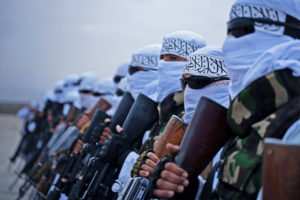Largely unremarked amid the drama, risk and controversy of its reaction to the October 7 attack is that, over the past year, Israel has experimented with a new type of warfare: targeting its enemies’ entire command structures. The occasional tactical assassination is as old as time, of course, and in the modern age has been commonly practised not just by Mossad but also the US, Russia and India, among many other governments.
What’s new about the recent Israeli method, however, is that it doesn’t stop at one or two important figures. Rather, they’ve gone after leaders, planners, strategists, figureheads and key implementers, with the obvious goal of not merely slowing down the adversary but actually crippling them, ideally beyond repair, and turning the population against them by demonstrating just how damaging these leaders are to their quality of life.
It’s too soon to say if this will become a key tactic in Israel’s arsenal, whether it will prove effective in the long run, and what responses it might draw from their enemies. Yet what we can speculate on is this: might a strategy that emphasises the enemy’s decision makers turn out to be good news for civilians?
The goal of bombing across many previous conflicts, notably the Second World War, was to demoralise the citizenry through starvation and destruction. As late as 2003, meanwhile, the goal of the US bombing blitz in Baghdad was to cow the Iraqi population into a state of “shock and awe”. The current Israeli goal, at least in theory, is to eliminate the people and infrastructure of their sworn enemies. This is a significant difference, and is potentially epoch-making.
The unjust distribution of the costs of war have been one of its eternal features. Wars are declared by leaders, planned by generals, fought by often-reluctant footsoldiers — and endured in misery by the population at large. To put it differently, it’s always been ordinary people, the conscripts on the frontlines and the mass of civilians behind, who bore the brunt of any war, and this hasn’t changed. According to the Red Cross, a full 90% of war-time casualties remain civilians.
In theory, these civilian losses are “collateral” damage, unintentional and regrettable consequences of fights between armed combatants. But the evidence shows that most lethal action against civilians is either deliberate, or else represents a consequence that was known in advance and judged to be acceptable. You don’t bomb a city like Dresden without realising that you’ll be burying women, children and the elderly in the rubble, with an estimated 30,000 perishing in February 1945. 7,500 civilians died during America’s initial bombardment of Baghdad, and thousands more were traumatised and maimed.
What if 2003 had gone differently? What if, instead of invading the country, the Americans had simply killed Saddam and his inner circles in a focused strike? There might have been no insurgency, no sectarian slaughter, no eventual Iranian triumph. Or, to return to the Second World War, what if the Allies had tasked Oppenheimer with focusing his scientific genius on developing missiles instead of atomic bombs, with the goal of destroying Hitler and his advisors in the Eagle’s Nest? What, to put it bluntly, if they’d targeted Hirohito not Hiroshima? Would that not have sacrificed one life for thousands?
It’s hardly a new question. I grew up with it. My grandmother, cynical over a lifetime of catastrophic military ventures that saw her survive the fall of the Austro-Hungarian Empire, the loss of two world wars, and the Soviet occupation of her country, perennially greeted global conflict with the comment that “the big shots with their big ideas should fight it out directly” and leave the civilians out of it. But, to reluctantly quote Steve Bannon, this was a pipe dream, because “the aristos never fight”.
And in fact, over more recent decades, psychopathic dictators not only sidestepped punishment, but were allowed comfortable exiles overseas. That’s what happened with Baby Doc Duvalier, the erstwhile Haitian despot, or Jean-Bédel Bokassa of the Central African Republic, who both found themselves living the high life in France. Alfredo Stroessner of Paraguay, protector of Josef Mengele and killer of political opponents, was hosted by Brazil. The theory behind this genteel approach was that a cornered dictator would fight to the death, thereby prolonging the bloodshed. Offer him an attractive way out, and more slaughter could be avoided.
Over time, though, this solution became less acceptable to global public opinion, ushering in our current era of sanctions and International Criminal Court arrest warrants. The approach sounded salient on paper, but in truth the ICC lacks any real muscle and has rarely proved effective either as a deterrent or as an instrument of justice. Just ask Vladimir Putin.
The Israeli approach, then, represents a far more impressive reframing of the question of accountability. As we’ve discovered, war always assumes collective guilt. But are civilians truly more deserving of punishment for the decisions of their leaders than those rulers themselves? “They went along with it,” we may say. And that’s true. Too often, indeed, fanatical leaders can count on the hysterical enthusiasm of the masses. “They elected them,” we point out, and that sometimes applies too.
Yet civilian populations are usually motivated by little more than the chance to prosper. Most people, moreover, are not heroes of the resistance. American voters did not choose a president in the knowledge that he would become obsessed with non-existent WMDs in Iraq. The fateful decisions, in short, are made at the top. What does a corporation do when it’s in trouble? Does it fire the entire staff, or replace the CEO? Isn’t it then both more just, and arguably more efficient, to go after the leaders?
A stronger objection comes from political scientists. While they generally agree that “decapitating” an enemy by taking out its leader is psychologically effective, they argue that the impact only lasts until a successor emerges, and all you may have achieved in the end is having created a martyr. What’s different now is that Israel seems to be aiming well beyond mere psychology, and is instead working to disable the broader command structures of its foes. It has focused on disrupting the enemy’s communication channels, as well as preventing new leaders from taking over. Just a day after killing Hassan Nasrallah, the IDF also targeted his Hezbollah successor.
From there, the list continues. Ali Karaki (Nasrallah’s longtime adviser); Eid Hassan Nashar (the commander of Hezbollah’s medium-range rocket force); Samir Tawfiq Dib (the commander of its southern front); Nabil Kaouk (deputy head of its central council); all these, and many more, have been killed in Israeli strikes. Nor has the IDF neglected its main ideological enemy: Iran. The assassination of top Hamas leader Ismael Haniyeh, while he was staying at an official military guesthouse in Tehran, is an excellent example. The suspicious death of Iran’s former president Raisi in a helicopter crash may or may not have been an accident — but anyway bears striking similarities to Israeli actions elsewhere.
To be clear, I’m not ignoring the appalling number of civilian casualties in Gaza, nor the impact on Lebanon. Nor do we yet know how other players may respond to this emerging new style of warfare. Mossad’s recent pager attack is a remarkable piece of spycraft, untangling adversaries from their surroundings. It plucked the Hezbollah members from the crowd, albeit imperfectly. But the similar weaponisation of daily items could plausibly yet be deployed by the West’s enemies too, with obviously unpredictable consequences.
So far, though, our assessment must be: tactical advantage Israel. Even after taking some time to think it over, Iran hasn’t been able to react innovatively to Israel’s attacks, instead launching its usual knee-jerk show of missiles into established Israeli defences.
If, then, we want to be optimistic: there’s a chance that Israel’s focus on going after the “brains behind the operations” might make leaders think twice before sending their lackeys off to die. And if not, it may at least drive a salutary wedge between violent-minded ideologues and the population at large, as the latter recognises that they’re better off without them. In fact, this may already be happening in Lebanon, where criticism of Hezbollah is beginning to be voiced by politicians and the public at large. Netanyahu’s message that the Lebanese people aren’t the enemy will need, in light of the damage they’re suffering, to be amplified with concrete offers of cooperation and support.
Disclaimer
Some of the posts we share are controversial and we do not necessarily agree with them in the whole extend. Sometimes we agree with the content or part of it but we do not agree with the narration or language. Nevertheless we find them somehow interesting, valuable and/or informative or we share them, because we strongly believe in freedom of speech, free press and journalism. We strongly encourage you to have a critical approach to all the content, do your own research and analysis to build your own opinion.
We would be glad to have your feedback.
Source: UnHerd Read the original article here: https://unherd.com/



